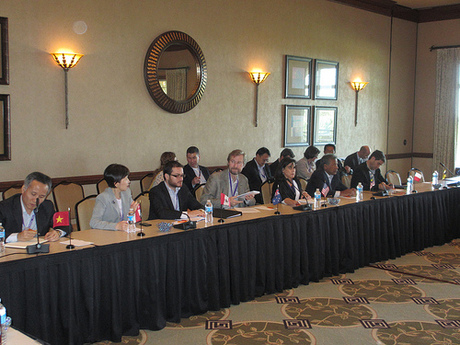TPP treaty threatens Aussie ISPs, IT Pricing Inquiry

A proposed cross-Pacific trade treaty could force greater liability on Australian ISPs for copyright violation by their users and jeopardise the IT Pricing Inquiry’s goal of equalising prices for Australian consumers.
Wikileaks last week published a leaked draft of the chapter of the proposed Trans-Pacific Partnership (TPP) agreement covering intellectual property and copyright law. The TPP trade treaty is being negotiated in secret by Australia, Brunei, Chile, Canada, Japan, Malaysia, Mexico, New Zealand, Peru, Singapore, the United States and Vietnam.
The leak makes it clear that the chapter is far from finalised, as numerous paragraphs in the draft are opposed by various nations, supported by others and still being debated by more. But some of the proposed agreements would have major implications for Australian businesses and consumers.
According to ITNews, a clause proposed by the US and supported by Australia would require ISPs to terminate accounts and block content from users found to have violated copyright law.
The leaked draft also suggests that Australia and the US are the only two nations opposed to ‘safe harbour’ provisions that would limit the liability of ISPs and web hosts for copyright violation by their users, except under certain exceptions.
Under other proposals, ISPs would be required to act on takedown notices sent by copyright owners and would be liable for ‘legal remedies’ if they do not help facilitate enforcing copyright.
Holding ISPs liable for infringement by their users would contravene the findings of the precedent-setting high court case between iiNet and several copyright owners, which concluded last year. In the case, iiNet was found not to be liable because it did not authorise alleged copyright violations by its customers.
Commenting on the potential impact of the treaty on ISPs, trade minister Andrew Robb told the Australian Financial Review that Australia will not support any provisions in the TPP “that would criminalise conduct that is currently legal in Australia”.
The treaty as it stands could also have major implications for Australian individuals. Consumer advocacy group Choice is “deeply concerned” with a series of proposals in the leaked TPP draft, CEO Alan Kirkland said in a statement.
Through the draft treaty, the US has proposed to expand criminal liability for copyright infringement, which could make domestic non-commercial infringement a criminal act. Over 100,000 Australians illegally downloaded the finale of TV show Breaking Bad, and under the new draft each would be liable for criminal charges, he said.
“While Choice condemns copyright infringement, we certainly don’t agree that an individual downloading Breaking Bad or Game of Thrones for personal use should be open to criminal prosecution.”
While Australia opposes this particular clause, Kirkland said the US has also proposed a series of measures “that would be disastrous for Australian consumers if they made the final text. This includes a ban on parallel importation, which involves purchasing products from overseas retailers and shipping them to Australia.”
This is particularly significant in light of the IT pricing inquiry which found that Australians pay on average 50% more for IT products than US residents.
As ZDNet notes, a specific recommendation of the inquiry was that consumers be given the right to circumvent geoblocking.
Yet one of the clauses proposed by countries including Australia would “prohibit circumvention of ‘technological measures’ put in place by copyright holders over their works”. The use of VPNs to to access geoblocked content or circumvent regional prices could potentially fall under this broad definition.
ANU College of Law Associate Professor Matthew Rimmer commented to Business Spectator that the Department of Foreign Affairs and Trade may have misled the pricing inquiry about the potential impact of the TPP treaty on IT prices in Australia.
“[DFAT] seem to be saying to the inquiry that they were fighting really hard on the topic, taking it seriously, and you kind of read the text that’s been leaked by WikiLeaks, and it’s not necessarily clear to me that Australia has been pushing for consumer rights and competition,” he said.
From an international perspective, other proposals by the US would increase the duration of copyright protection to life of the author plus 95 years, implement stronger patent rights, allow for software patents and put restrictions on jailbreaking devices. As a result, ExtremeTech’s Joel Hruska said the US’s contribution to the draft represents a “doubling down on the failed ACTA treaty”.
At best, he writes, “this kind of posturing looks deeply hypocritical to the rest of the world. At worst, it means business interests have so hijacked the international treaty process, it’s no longer functioning to secure American rights.”
Four ways AI can finally make threat intelligence useful and not just noisy
Done poorly, threat intelligence is noise. But done well, it becomes one of the most powerful...
Australia’s top tech priorities for 2026
It is anticipated that AI will evolve from a pilot project to a productive standard, underpinned...
Why AI's longevity lies in utility, not novelty
The real potential of AI is in underpinning the invisible systems powering everyday business.







